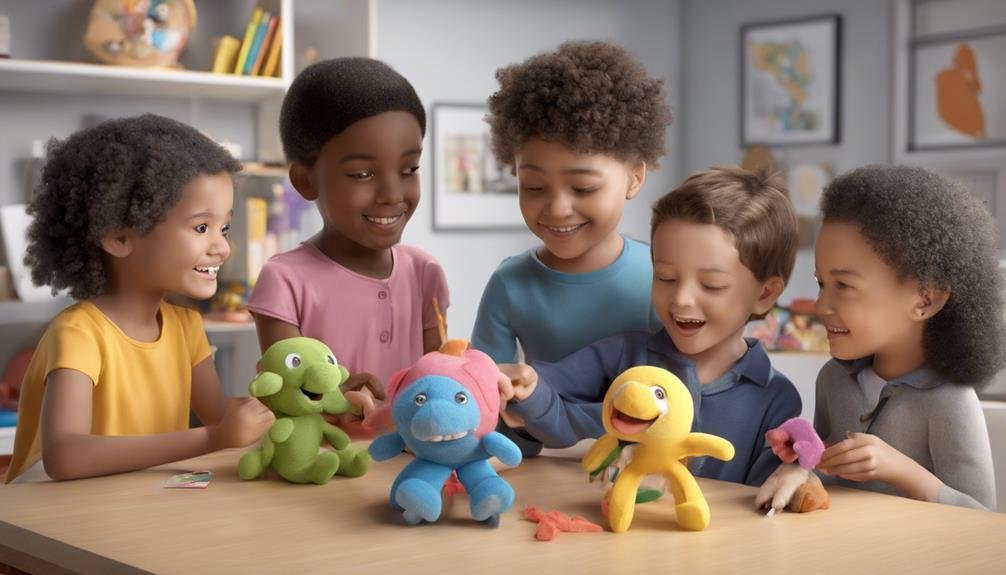Pediatric Speech Therapy: Nurturing Communication Skills in Children
When it comes to helping children navigate the intricate world of communication, Pediatric Speech Therapy serves as a guiding compass. Imagine the transformative power of nurturing a child's ability to express thoughts, feelings, and needs effectively. The journey of building strong communication skills in children is not just about words but also about fostering connections and confidence. Discover the impactful strategies and supportive environment that pediatric speech therapy offers to lay a solid foundation for lifelong communication success.
Key Takeaways
- Enhances language development and social skills.
- Tailored interventions for speech and language disorders.
- Utilizes play-based techniques for a fun learning environment.
- Encourages parent education and involvement for continued progress.
- Fosters consistent caregiver support for practicing therapy techniques.
Benefits of Pediatric Speech Therapy
Explore how pediatric speech therapy can greatly enhance your child's communication skills and overall development. Speech milestones are vital markers in your child's language development journey. Through pediatric speech therapy, your child can work towards achieving these milestones effectively. Therapists are trained to tailor interventions that specifically target areas where your child may be struggling, helping them develop essential language skills.
Language development is a complex process that varies from child to child. Pediatric speech therapy provides a structured approach to support your child in reaching language milestones. Therapists use evidence-based techniques to improve your child's vocabulary, grammar, and comprehension abilities. By participating in therapy sessions, your child can enhance their communication skills, leading to improved interactions with family, friends, and teachers.
Investing in pediatric speech therapy can empower your child to overcome communication challenges and reach their full potential. By focusing on speech milestones and language development, therapists can guide your child towards successful communication skills that will benefit them throughout their lives.
Common Communication Challenges in Children
Children commonly face communication challenges that can impact their language development and social interactions. These challenges can manifest in various ways, making it important to address them early on to support the child's overall development.
Here are four common communication challenges children may encounter:
- Speech Articulation Issues: Difficulty pronouncing sounds or words clearly can hinder effective communication and lead to frustration.
- Language Processing Delays: Trouble understanding and expressing language effectively may affect academic performance and social interactions.
- Stuttering: Involuntary disruptions in speech flow can impact a child's confidence and willingness to engage in conversations.
- Social Pragmatic Difficulties: Challenges with social cues, turn-taking, and maintaining conversations can hinder forming and maintaining friendships.
Recognizing and addressing these challenges through pediatric speech therapy can greatly improve a child's language development and social interaction skills, setting a strong foundation for their future communication abilities.
Role of Speech Therapists in Child Development
Addressing communication challenges in children requires a collaborative effort that involves speech therapists playing an essential role in nurturing their language skills and social interactions. Speech therapists are pivotal in supporting children's language development by identifying and treating speech and language disorders, such as articulation difficulties. Through tailored interventions, they help children improve their ability to express themselves clearly and effectively. Articulation therapy is a common technique used by speech therapists to target specific speech sounds that a child may struggle with, enhancing their overall communication skills.
Speech therapists create personalized treatment plans that cater to each child's unique needs, focusing on improving their articulation, phonology, vocabulary, and grammar. By working closely with children, speech therapists not only address their speech difficulties but also boost their confidence in communicating with others. Through engaging activities and exercises, speech therapists guide children in developing essential language skills that are fundamental for successful social interactions and academic achievement. The role of speech therapists in child development is crucial, as they empower children to overcome communication challenges and thrive in various aspects of their lives.
Techniques Used in Pediatric Speech Therapy
Utilizing a variety of specialized techniques, pediatric speech therapists work diligently to enhance children's communication skills and support their overall language development. When working with young ones, therapists employ techniques tailored to each child's unique needs, fostering growth in both articulation and language skills.
Here are four key methods commonly used in pediatric speech therapy:
- Articulation Therapy: Through targeted exercises and practice, therapists help children improve their pronunciation and speech clarity, boosting their confidence in verbal communication.
- Play-Based Techniques: By incorporating play into therapy sessions, therapists create a fun and engaging environment where children can learn and practice new communication skills naturally.
- Language Development: Therapists focus on expanding vocabulary, sentence structure, and comprehension to enhance a child's overall language abilities and foster effective communication.
- Social Skills: In addition to language, therapists work on pragmatic skills like turn-taking, maintaining eye contact, and understanding social cues to help children navigate social interactions successfully.
Through these techniques, pediatric speech therapists play an important role in nurturing children's communication skills, setting them up for success in both academic and social settings.
Importance of Early Intervention in Speech Therapy
To best support your child's speech and language development, early intervention in speech therapy is key. Early intervention plays an essential role in addressing speech delays, ensuring your child reaches important speech milestones on time.
By identifying and addressing speech and language issues early on, you can greatly improve your child's language development and communication skills. Speech therapists are trained to create personalized intervention plans tailored to your child's specific needs, using a variety of communication strategies to enhance their speech capabilities.
Through early intervention, speech therapists can help your child overcome obstacles in their language development, providing them with the necessary tools to communicate effectively. By starting speech therapy early, you're giving your child the best possible chance to develop strong communication skills, setting a solid foundation for their future success in both academics and social interactions.
Trust in the process of early intervention, and watch as your child's speech and language abilities flourish.
Building Confidence Through Speech Therapy
Through speech therapy, children can develop not just their communication skills, but also their confidence in expressing themselves effectively. Building confidence through speech therapy is an essential aspect of a child's development. Here are four ways in which speech therapy helps in boosting confidence and enhancing communication skills:
- Positive Reinforcement: Speech therapists provide constructive feedback and encouragement, fostering a positive environment where children feel supported and motivated to improve.
- Progress Tracking: By setting achievable goals and tracking progress, children can see tangible improvements in their communication abilities, leading to a boost in self-assurance.
- Skill Development: Through tailored exercises and techniques, speech therapy equips children with the tools to communicate more clearly and confidently in various situations.
- Role-Playing Scenarios: Practicing real-life scenarios in a safe space allows children to build confidence in their communication skills and prepares them for different social interactions.
Support for Parents and Caregivers
Parents and caregivers play an important role in supporting children undergoing speech therapy by providing consistent encouragement and reinforcement at home. Parent education is key in understanding the therapy process and how to continue progress outside of sessions. Caregiver involvement is essential for practicing techniques taught during therapy sessions, ensuring that the child receives consistent support. Family support is necessary for creating a nurturing environment where the child feels comfortable and motivated to improve their communication skills.
Communication strategies can be shared with parents and caregivers to help facilitate language development and enhance the effectiveness of speech therapy. Encouraging active listening, engaging in meaningful conversations, and creating opportunities for the child to practice their speech in everyday situations are all valuable techniques. By implementing these strategies consistently, parents and caregivers can further support their child's progress and reinforce the skills learned during therapy sessions. Remember, your involvement and dedication make a significant difference in your child's speech therapy journey.
Conclusion
In the world of pediatric speech therapy, you're the guiding light that helps children discover the treasure trove of communication skills. Just like a nurturing garden, speech therapists plant seeds of confidence and watch as children bloom into confident communicators.
With your support and dedication, you're sculpting a path towards bright futures filled with clear, expressive conversations. Keep shining your light, for you're truly making a difference in the lives of these young ones.







